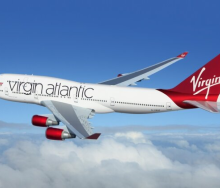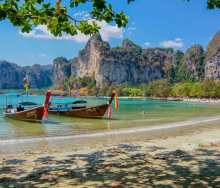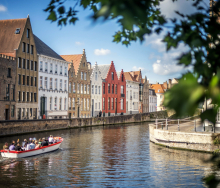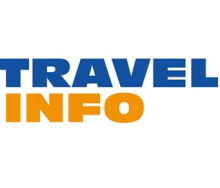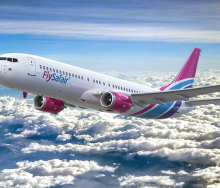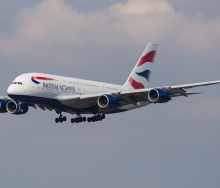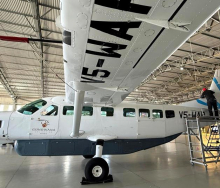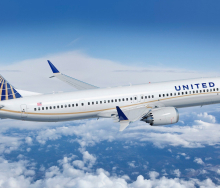THE travel industry
continues to focus 2020
technology developments
on integrating systems
from front- to back-end for a
simpler and smoother booking
process.
Travel companies are
currently driving integration
of travel systems and
customer enterprise resource
planning (ERP) applications
in a big way, says director of
Simpliflyer, Jim Weighell.
This means they are
combining online booking
tools with direct data profile
feeds from customer HR
systems, travel policies
and approval systems to
eliminate repetitive tasks and
to empower consultants to
focus on high-touch, high-yield
business transactions.
Even with this technological
innovation, human interaction
still remains the vital
ingredient that business
travellers and clients want,
says Marco Ciocchetti, ceo of
the XL Travel Head Office.
“TMCs must increasingly
harness data and tools such
as artificial intelligence,
predictive analytics and
chatbots to provide value.
We intend to fill this role by
making strategic investments
in new technology and
qualified staff, creating an
appropriate balance of ‘man
and machine’.”
For travel firms using
chatbots for up- and crossselling, vice president of
communications of Amadeus,
Daniel Batchelor, cautions
that when integrating these
services, it is critical to
know when to transfer the
conversation to a real agent
to avoid site abandonment by
customers.
Jim adds that GDS
companies remain the
leaders in consolidating multichannel inventory sourcing,
particularly for NDC and new
accommodation options.
Adrian Roodt, country
manager for Southern Africa
at Travelport, says in the next
year, research indicates there
will be an accelerated rate of
change in the way travel is
retailed and purchased online.
“This includes wider and
more complex multi-content
reach, more enriched and
comparable offerings, more
focus on relevance than
magnitude, and increase
in automation that enables
customer self-service.”
Communications, events
and facilities manager of
Tourvest Travel Services,
Tracey van den Berg,
says Tourvest technology
integrates seamlessly into the
customer’s front- and backoffice systems to ensure they
have a 100%-compliant endto-end solution secured by the
highest PCI and GDPR security
solutions. In this way, Tourvest
technology drives compliance
as well as consultant and
customer behaviour and
reduces human error.
Another aspect to simplified
bookings for travel consultants
is that the new point-and-click
GDS formats eliminate the
requirement for old-format
cryptic entries, says Jim.
New-generation travel
consultants are already using
the graphical point-and-click
workflow, as opposed to
traditional GDS screens, says
Jim, while customers book
simple, domestic itineraries
through online systems.
“Sabre’s automated
workflows, for instance,
reduce errors and save
costs, achieving 100%
control compliance and
90% touchless ticketing.
Online training and system
enhancement information are
readily available at any time
for consultants, with live-chat
support becoming increasingly
popular,” explains Jim.
Richard Addey, md of
Sabre Travel Network, UK,
Ireland, Benelux and SA, says
Sabre’s Red 360 will soon
allow travel consultants to
request, compare and book
NDC offers through Red 360
Air Shopping, which will be
presented side-by-side with
traditional air content in one
single display.
“Sabre is also taking on
intelligent retailing with
Content Services for Lodging
(CSL). This is a new suite of
APIs that integrates Sabre
hotel content alongside
aggregator content from
Booking.com, Expedia and
Bedsonline into a cohesive
and consistent display,” says
Richard.
This allows travel
consultants to filter out
options that don’t meet
traveller requirements. It
also helps agents factor in
commissions and corporate
discounts in a single screen,
he explains.
Yet for Travel Counsellor
Karin Livingstone, while pointand-click booking systems
definitely make it easier for
new consultants to enter the
industry – they don’t need
to learn hundreds of airport
codes, booking entries and
airline codes – she still finds
herself reverting to the old
GDS code format.
After 16 years in the
industry, Karin says she
navigates the code screens
faster and feels that they
still provide consultants
with greater visibility when
it comes to fare displays,
availability and flight
seasonality.
Did you know?
Travelstart is sponsoring the first WiT (Web in Travel)
conference in Africa to be held in Cape Town on May 28.
WiT events focus on how technology is changing customer
behaviour and how travel companies must evolve and adapt.
They champion innovation and foster start-up ecosystems by
bringing entrepreneurs and investors together and connecting
regions with global markets.
Use tech to make travel more accessible
REQUESTS for assistance
for airline passengers with
intellectual disabilities have
increased dramatically in
South Africa since Travelport
launched its global Travel
Unified campaign to raise
awareness of the dedicated
Special Service Request (SSR)
booking code, DPNA.
“From March up until the
end of September last year,
use of the DPNA code on
flight bookings made through
Travelport increased by 468%
in SA,” says Adrian Roodt,
Travelport country manager,
Southern Africa.
“This is above the Africa
average of 388% and far
outpaces the global increase
of 106%. We’ve also seen the
code used for the first time
in many countries around
the world, including Nigeria,
Zambia and Kenya in this
region.”
Before the campaign, which
included sign-on alerts and
graphical prompts in Travelport
Smartpoint, of the more than
250m flight bookings made
through Travelport in 2018,
the DPNA code was applied to
just 4 309 bookings – about
0,0015%, says Adrian. This is
despite an estimated 2,6% of
the world’s population having
an intellectual disability.
Linda Ristagno, Iata external
affairs manager, says since
air travel is such an integral
means of transport in today’s
world, people with disabilities
– visible or not – should have
access to safe, reliable and
dignified travel.
“We encourage the travel
industry to continue to raise
awareness of the code and for
passengers with disabilities
to know that they are always
welcome on board.”
Humiliating experience
However, feeling dignified and
welcome on board was not
the recent experience of a
paraplegic client who books
through Mary Goslin, director
of Sure Penzance Travel.
The agency often uses an
SSR code as a matter of
course, but Mary says airlines
and airport staff do not
respond appropriately.
“We always have to call
the airline to check that the
request is processed and
confirmed. Even if we use
the code, however, it doesn’t
mean that it will translate into
a better experience for the
passenger.”
In this particular case,
Mary’s client, a South African
Paralympian, who also only
has one arm, was left so
humiliated by his experience
with an airline that he fell into
a deep depression because
he felt like such a burden to
everyone.
“He boarded last instead of
first so this happened in front
of all the other passengers.
The crew dropped him while
expecting him to stand and
lift himself up out of his
wheelchair to move across
in to his seat. The more he
battled, the more irritated
the crew became. Eventually
his helper – a 69-year-old
– eventually tried to lift him
herself.”
After landing, Mary says no
one helped him get into his
wheelchair and his helper
was left to run up and down
a strange airport to find
assistance. To make matters
worse, the airline damaged
his wheelchair, designed
specially to accommodate his
disabilities. “This is his lifeline
and his only means of getting
around. It took the airline
three months to pay out the
R14 000 repair bill.”
Mary appeals to airlines that
if they cannot accommodate
passengers with disabilities
appropriately, then they must
advise agents beforehand not
to book these passengers with
them instead of taking it out
on the passenger.
TNW took the question to
Qantas Airways, which aims
to be the airline of choice for
customers with specific needs.
Regional manager Africa,
Michi Messner, says based
on the volume of wheelchair
requests the airline receives
in Johannesburg, for example,
the majority of South African
agents are using SSR codes in
operations.
Michi says Qantas – which
has a dedicated specific needs
team – offers various types of
assistance for customers with
reduced mobility and other
specific needs.
“Some of these things
include meet-and-assist
services; assistance with
boarding and disembarkation;
mobility assistance; use of
approved passenger-lifting
devices as well as assistance
with transits and transfers.”
On-board support
When it comes to on-board
support, Michi says
the seating allocation
system gives appropriate
consideration to customers
with specific needs.
“Our aircraft are equipped
with torso-harness restraints
that enable a customer to
remain upright during takeoff, landing and, if necessary,
throughout the entire flight.
This is in addition to special
meals, stretchers, allowing
certain authorised medical
equipment for use on board
and a continuous improvement
ethos.”
To do more, the biggest
area is creating awareness,
says Michi. Karin Coetzee,
occupational therapist and
founder of the website and
database, Disabled Travel,
agrees that there is not
adequate awareness about
specific challenges. Part of
the problem is that travel
agents don’t always ask
the necessary information
about the level of disability,
equipment used and
assistance needed, she says.
This information is crucial
when making bookings,
not only for airlines, but for
accommodation too. “A client
at a guest house was unable
to access the toilet with his
large wheelchair and had to
use the toilet in the nearest
Wimpy restaurant.”
Access to transport, tourist
attractions and restaurants
also needs to be considered.
“A client in a wheelchair and
his wife were booked at an
accessible guest house but
unable to manage the steep
hill up and down the street to
access the bus stop for their
planned daily trips into Cape
Town,” Karin adds.
Travelport understands that it
can be difficult for consultants
to talk with customers
about intellectual or physical
disabilities, says Adrian, but
it should become a standard
part of the booking discussion
to ensure all parties are
supported in the right way.
Travel agents should also
phone an airline the day before
the client travels to ensure the
SSR is still in place and get a
staff member’s name to give
to the client as a contact at
the airport, Karin recommends.
Adrian says while Travelport
is thrilled to see progress –
and the increasing number of
airlines rolling out initiatives to
enhance the support they can
provide – there are no illusions
about how long the road
ahead still is.
“For instance, the 468%
increase in SA translates to
some 220-plus bookings
only.
Did you know?
The DPNA SSR code needs to be accompanied by additional
descriptive free text, so the airline understands the support
required. Once an Iata member airline has received the code, a
response acknowledging the request is mandatory.
Better travel needs better tech
THE staggering amount
of false advertising in SA
makes it very difficult for
travellers with special needs
to plan a holiday, says Karin
Coetzee of Disabled Travel.
“Never trust
accommodation websites
advertising ‘wheelchairfriendly’ establishments. Only
22,7% truly are accessible to
a degree. Use a facility that
verifies the information and
accessibility.”
The fact that most
municipalities do not enforce
building regulations regarding
accessibility for persons with
a disability leaves SA with
a legacy and reputation of
inadequate facilities, she
says.
“The correct specifications
for universal design
of accommodation
establishments and tourist
attractions as well as the
huge need for accessible
transport in SA also needs to
be addressed.”
Better travel needs better tech
TRAVEL with Flair (TWF)
defines itself as a travel
management group that is
becoming an IT company.
Predominantly serving
South Africa’s corporate
and public sector, TWF has
a founding board of the
same four partners since
1996. Their main mandate
has been to invest hugely in
technology and automated
self-booking tools, according
to director, Robert Wilke.
That’s where its online
booking tool, Cliqit, comes
into the picture. The booking
tool has been largely
successful and has been
running for five years now.
There is great potential for
Cliqit to be taken into the
rest of Africa and the world.
Comparing 2018 and
2019, TWF has seen a
growth rate of 150% with
regard to its corporate
clients moving to the online
environment.
One of the biggest
challenges has been
convincing the public sector
to adopt tech into their
travel. While corporates are
quick to come to the party,
Robert says the trend with
government is that they
intend to move only between
50% and 60% of their
travel spend to an online
environment within the next
three to five years.
“Government has to catch
up with the technology
and adapt to new systems
such as approving travel
via a mobile phone,” says
TWF’s newly appointed chief
information officer, Khalil
Sattar.
High-speed help from TIC
TIC’s new app that
launched in November last
year (TNW November 6,
2019) simplifies the
policy-holder’s experience.
Importantly, it has a chat
feature for travellers
to contact assistance
providers directly
when needed. TIC
manager – sales
and marketing,
Simmy Micheli,
says in
emergencies
travellers often
contact their
travel agent
instead of the
assistance
provider, which
delays the
process. TIC
hopes the app
will discourage
this so travellers
can receive help
immediately. If the
phone GPS is on, the
chat feature also supplies
the assistance company
with the traveller’s exact
location. Travellers
can also access policy
documents as well
as upload claims and
supporting documents.
How to maximise digital marketing with a small budget
NOO Media founder, Johannes
Vogel, works with a number
of travel agencies to run their
digital marketing campaigns,
including XL Travel Head
Office.
He says often agency
owners initially feel
overwhelmed by ad word
bidding or are reluctant to
invest in digital marketing
after unsuccessful in-house
attempts. For this reason, he
recommends working with a
professional digital marketing
company that can design
campaigns tailored specifically
to an agency’s business.
It is possible to put a
successful campaign together
for a small agency from as
little as R5 000 to R10 000 a
month, he says.
Johannes encourages
agents to take advantage of
free options to enhance their
digital marketing presence.
Consortiums’ head offices
often create a lot of content
that members can use and
he reminds agents that social
media accounts can be set up
free of charge.
“When working on social
media campaigns, we
encourage agents not to lose
sight of the fact that travel
is fun. Engage regularly and
don’t limit posts to sales
pitches. Focus rather on
sharing interesting content,
beautiful travel photos and
videos.”
Johannes says bidding on
ad words consistently offers
the quickest returns for travel
bookings. “While a Facebook
campaign can start from as
little as R500, remember that
people aren’t visiting social
media to buy things.
“These days Google is the
space where most people
research their corporate and
leisure trips, which is why
being listed in the top-three
results of a particular search
– which 99% of users click on
– is so important,” he says.
Johannes suggests that
smaller agents initially avoid
bidding on popular ad words
such as ‘Mauritius holiday’
or ‘Thailand holiday’, as this
is where the big players
compete, making the
words expensive. Instead
he recommends focusing
on niche destinations that
the agency is skilled at
selling.
The agency’s web content,
landing pages and consulting
knowledge must be relevant
to the campaign. Agents
also need to ensure that
their businesses are set
up to respond to online
leads timeously, as people
searching online are looking
for instant responses.
“It is important that
consultants are engaging
with clients within two hours
of receiving a lead to avoid
losing the sale. If your small
business can’t compete on
the basis of price, you can
always compete on service,”
he says.
One of the greatest
advantages of digital media
campaigns is how precisely
measurable they are.
“With every campaign, you
can see exactly how people
are navigating your site, what
works well and where clients
are being lost,” he says.
This allow campaigns
and website content to be
tweaked during the campaign
to convert sales more
successfully.
Do you know what to do with your data?
TRAVEL agencies – aware that
it is more costly to acquire a
new customer than to retain
an existing one – are using
client data combined with the
personal touch to understand
customers better and keep
them booking year after year.
“We have always worked with
data, whether it is stored on a
computer, in the cloud or even
simply on a pad of paper,”
says Marco Ciocchetti, ceo of
XL Travel Head Office.
“The introduction of big data
over the past decade – the
extremely large data sets that
can be analysed to reveal
patterns and trends in our
customers’ behaviours and
interactions – has, however,
drastically upped the game for
service delivery and consumer
expectations.”
Travelstart md, Jerome
Touze, says companies now
have access to more data
than ever before, but knowing
what to do with it is what
matters most.
“Data should be treated as
a valuable business asset
and used ethically to enrich
the connections you build with
your audience,” he says.
“It should be able to tell
you which customer to keep
and how to do so. From
purchasing habits, value
and frequency, you should
be able to determine the
Customer’s Lifetime Value and
to customise your marketing
messages to the right
audiences.”
Travel Counsellor Karin
Livingstone says when she
is introduced to customers,
she loads their details
into Phenix, which is both
a booking and CRM data
management system used
by Travel Counsellors.
The system allows her
to load everything from
passport details to frequent
flyer numbers, seating
preferences, birthdays and
anniversaries. It also has
a field for inputting details
about a client’s family
members and interests.
Phenix collects the data and
automates functions that
allow TCs to build client
relationships. These include
notifications about client
birthdays and automated
‘have a safe journey’ and
‘welcome home’ cards.
“Using data to keep in
touch with clients is a
great way to keep Travel
Counsellors top of mind.
An automatic message on
its own, however, is not
enough to win over a client
in the long term. We are
encouraged to pair the
benefits of technology with
the personal touch at
every point,” she says.
To illustrate what she
means, a while ago Karin
sent out a small, last-minute
travel insurance quote to
a customer who had been
referred to her. “I didn’t get
that booking, but as I had
entered his details in Phenix,
I received a reminder about
his birthday months later.
I used the opportunity to
send a card and catch up
with him.”
He was so impressed
that a consultant (whom he
hadn’t even booked through)
remembered his birthday,
that he booked his next
trip – a R100 000 package
including premium economy
flights and a G Adventures
package – with Karin.
Noo Media’s Johannes
Vogel says there are a
number of web-tracking tools
that use data to determine
the interests of customers
on a website in terms of
which pages they visit, how
long they spend there and
where they lose interest.
Nomadical spokesperson
Lillie Elpida adds that online
fulfilment of travel bookings
allows agencies to improve
the type of data gathered
about traveller choices to
create a personalised travel
experience.
She recommends
regular sanitation and
validation of data as well
as segmentation based
on specific criteria to
ensure that data acquired
is relevant, reliable and
able to be of use for future
campaigns.



